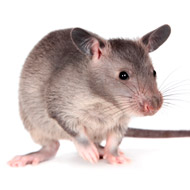Giant rats trained to sniff out TB

The rats are exposed to the sputum in a cup and are rewarded for their efforts with mashed banana.
Giant pouch rats are using their incredible olfactory powers to sniff out tuberculosis (TB) in Africa.
So far the rats have identified some 10,000 TB patients who were missed by conventional screening.
Originally the sensitive and intelligent creatures were trained to detect landmines.
Speaking to news website CBC Dr Stewart Reid, a medical advisor for the HeroRAT Programme, described the practice as 'a little bit unorthodox'.
TB bacteria release compounds in human saliva and the rats are able to detect the aroma consistently and with a considerable degree of accuracy, Reid told CBC.
The rats are exposed to the sputum in a cup and are rewarded for their efforts with mashed banana.
According to the charity Apopo, which is training the rats, TB ranks as the leading cause of death from an infectious disease worldwide.
In many developing countries, the disease is still detected through microscopy. But the method is slow and between 20-80 per cent of positives can be missed, depending on the resources available and the skills of the technician.
Apopo says their detection rats technology is a fast, accurate and cost-effective screening tool to accelerate effective TB control.



 The BSAVA has opened submissions for the BSAVA Clinical Research Abstracts 2026.
The BSAVA has opened submissions for the BSAVA Clinical Research Abstracts 2026.